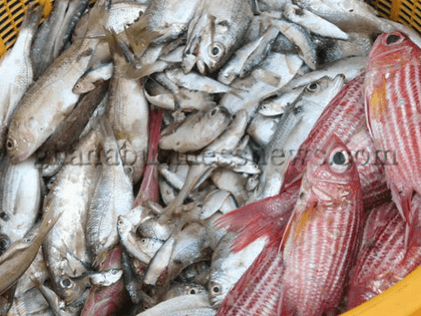Ghana’s fish stock said to be dwindling
 Stakeholders in the fishing industry in Ghana are unhappy about the country’s dwindling fish stock.
Stakeholders in the fishing industry in Ghana are unhappy about the country’s dwindling fish stock.
At a durbar in Keta to mark the World Fisheries Day on the theme “Securing Sustainable Small-Scale Fisheries; Fisher to Fisher Approach”, players in the industry from across the country lamented that over fishing, which was aided by illegal methods had led to low out puts.
Mr Mark Newton, USAID Ghana Energy Advisor, said activities of both local and foreign fishing vessels contributed to the problem, which threatened small-scale fisheries along the coast with irreversible consequences in the future.
He said the situation had caused close to ten per cent reduction in annual yield targets, and that although the effective management of fisheries was a complex task, commitment to a clear cause held the key to securing the source of over 60 per cent of all protein in the country.
Mr Newton said the USAID, recognising the need to secure the livelihood of some 2.6 million Ghanaians in the fishing sector had partnered government on efforts to sustain the industry and together had initiated the Sustainable Fisheries Management Project (SFMP).
He said among others, a Fisheries Watch Volunteer programme to encourage local fisher-folk into taking up watchdog roles, and inter fisher-folk dialogues on resource sustainability had been effected in collaboration with the Fisheries Commission and the Ghana National Canoe Fisherman Council.
Mr Newton said Ghana’s National Marine Fisheries Management Plan had the potential to uphold the sector by fighting harmful fishing practices towards replenishing fish stock, and called on fishing communities and other stakeholders to uphold the initiative.
“To successfully ensure that fishing regulations are followed, the people directly affected by the rules must be involved in the implementation of government’s plan and work towards a situation where people can meet their needs without endangering their future,” he stated.
Mrs Elizabeth Naa Afoley Quaye, the Minister of Fisheries and Aquaculture, said the SFMP-Fisheries Commission’s policy framework on fisheries co-management had realised mangrove restorations and other resource replenishment programmes in the Pra, Densu and Ankobra estuaries.
She said the Ahotor Oven; an improved and approved fuel efficient fish smoking system was being rolled out across the country and would help reduce health risks and environmental degradation.
Mrs Quaye said a gender-mainstreaming strategy document was signed in 2016 to guide the Ministry in ensuring the direct participation of women in fisheries management and that SFMP was also supporting government in the fight against child labour and trafficking; a major challenge in the fishing industry, by helping develop and implement some strategies.
She said SFMP had committed to securing fisher-folk by working with the Millennium Insurance, UT Life Insurance and Vodafone in the establishment of the Fishers Future Plan insurance scheme to benefit over 100,000 people.
Mrs Quaye appealed to the public to support the fight against illegal fishing and said the Navy would intensify its monitoring and offenders would be made to face the law.
Togbe Sri III, Paramount Chief of Anlo State who chaired the occasion, said fish stock in the Anlo area was diminishing faster, with the danger of unemployment and hunger and underscored the need for a sustainable solution.
Source: GNA
